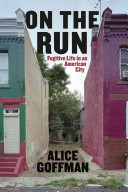Ahmer Qadeer
8 Articles
Last 30 days
Last 6 months
Last 12 months
Last 24 months
Specific Dates
From:
To:
PREMIUM
On the Run: Fugitive Life in an American City
This is an academic book that will appeal to general readers.
PREMIUM
Chasing the American Dream: Understanding What Shapes Our Fortunes
This engaging and thought-provoking combination of thorough scholarship, narrative journalism, and policy analysis will resonate with readers interested in understanding American poverty and opportunity.
PREMIUM
Cutting Along the Color Line: Black Barbers and Barber Shops in America
While intriguing and thoroughly documented, recognizing incongruities, tensions, and the ironies that arose from barbershops functioning both as businesses and as cultural institutions, Mills's book is not organized so as to keep his central themes clear. Specialists with a deep interest in the history of race, African American culture, and politics will find it useful, but readers with a more general interest may be lost by the difficult structure.
PREMIUM
(1)ne Drop: Shifting the Lens on Race
Blay's mission is to spark conversations about race and identity. The beautiful photography and simple narratives make her book widely accessible to general readers. Scholars, specialists, and others focused on examining this subject, however, are likely to find it lacking nuance and precision.
PREMIUM
If Mayors Ruled the World: Dysfunctional Nations, Rising Cities
Barber has a knack for describing promising trends, and this work will grab the attention of readers interested in politics and urban issues. However, his almost uncritical treatment of the interrelated subjects will make this title less useful for those researching difficult policy issues.
PREMIUM
Coming Up Short: Working-Class Adulthood in an Age of Uncertainty
While this work is timely, thorough, and important and asks very good questions, it is written with professionals in mind. This title will appeal to readers of sociology and to social scientists with an interest in class.
PREMIUM
Floating City: A Rogue Sociologist Lost and Found in New York's Underground Economy
At times Venkatesh is overly reflective on his status as a "rogue sociologist" who challenges the academy rather than focusing on the questions he is probing. Nonetheless, this is an exciting and compelling work for general readers. It relies heavily on narrative techniques and is light on theory and figures. Readers interested in the daily workings of the illicit economy will be fascinated by the complexities and contradictions of the underground economy that Venkatesh details. [See Prepub Alert, 3/18/13.]
PREMIUM
Doing the Best I Can: Fatherhood in the Inner City
This thoroughly researched and well-crafted study analyzes how these men view their lives, actions, and family bonds. Similar to William Julius Wilson's When Work Disappears: The World of the New Urban Poor, now over ten years old, it will appeal to readers interested in focused surveys of urban life. Those who prefer an approach that's long on theory or policy solutions may be disappointed.
ALREADY A SUBSCRIBER? LOG IN
We are currently offering this content for free. Sign up now to activate your personal profile, where you can save articles for future viewing









